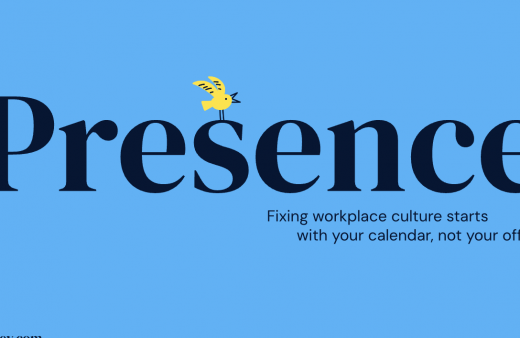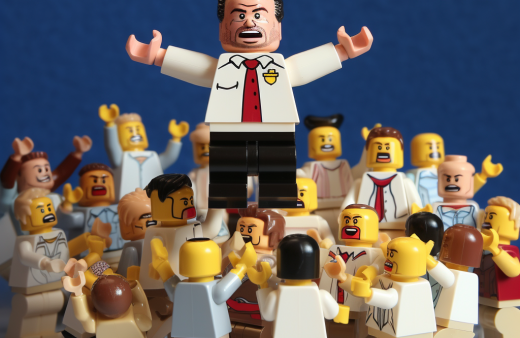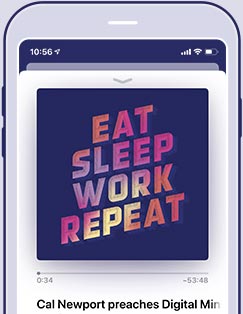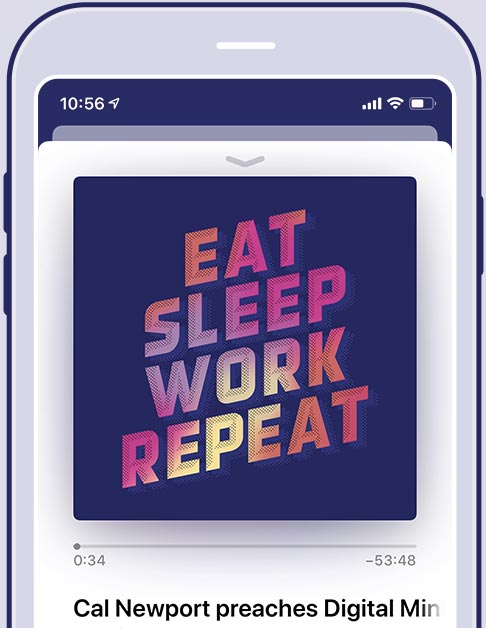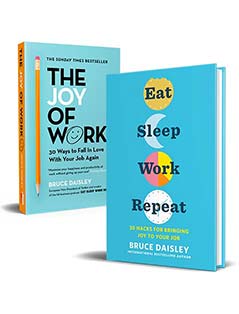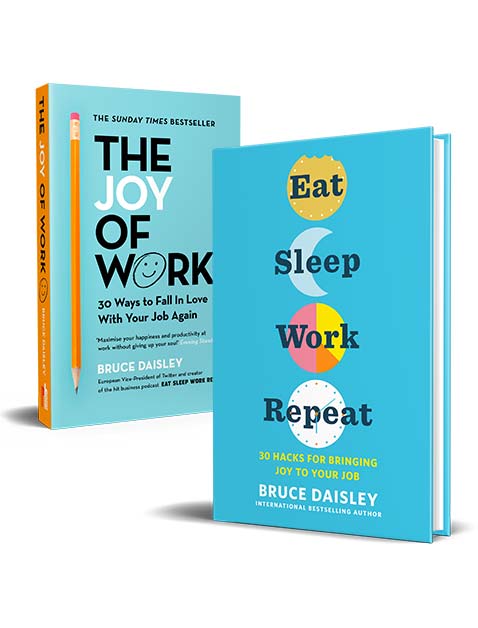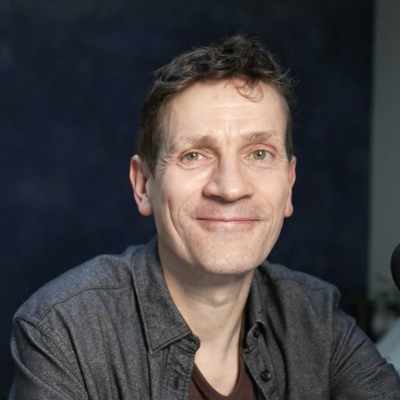Presence: presence starts with positive leadership
Here’s the last discussion about the Happiness Track
HBR: The Best Leaders Have a Contagious Positive Energy
HBR: Proof That Positive Work Cultures Are More Productive
Today is the first of series of podcasts about an idea that needs more consideration in our workplaces. The idea of presence.
Emma Seppala is a psychologist and lecturer at the Yale School of Management – she also runs the Women’s Leadership program there. I first spoke to Emma about 6 years ago when I came across her book the Happiness Track. The hypothesis of that book was in many ways the sweet spot of this podcast: the notion that if you make workers happy then they do their better work. Emma had a new book out this week called Sovereign and it felt like a great reason to have a new conversation.
The conversation leads into the next block of podcasts which are all about the idea of presence. Over the last 4 years we’ve seen discourse from CEOs about wanting workers back in the office but in many ways they’re putting things the wrong way wrong. A lot of us find ourselves making our way into work and sitting on video calls all day. Or having headphones on because its so noisy. We got home at the end of the day thinking ‘what was the point of that’.
When bosses say they want us to be present in the office, what they actually describe is something different. They talk us about us interacting, having ideas, watercooler moments. Bosses say they want us to be present in the office, but what they really want is presence, for us to be in each others company.
For me presence is related to flow.
Flow is the state of being in which people become so immersed in the joy of their work or activity “that nothing else seems to matter.”
Presence is to be in a flow state of connection with others.
The next few podcasts are about how to achieve that presence. How we don’t need lots of it to create an impact and how location is less important than presence but it can help.
As you’ll hear Emma is teaches positive leadership which is strongly based on evidence that leaders who cultivate their presence have more impact.
Transcript generated by the pesky robots, don’t trust it
Bruce
Emma. it’s great to have you back. I wonder if you could introduce yourself for maybe people who didn’t listen to the first episode.
Emma
Yeah, sure. I’m a lecturer at the Yale School of Management. I’m a psychologist and research scientist who’s studied the science of well -being and interventions for mental health, well -being, anxiety. I also research and teach positive leadership to executives at the Yale School of Management and I’m faculty director of the Women’s Leadership Program. So I spend most of my time educating and learning from leaders and executives.
Bruce
Positive management, is that related to positive psychology? What would that look like?
Emma
Yeah, well, I’m glad that you asked that question, because it’s basically a field of leadership research that very few people know about, but it’s the future of leadership because it leads to the best results, a better bottom line, greater engagement, greater workplace well -being, greater innovation. I mean, it’s the key to it’s what the future holds for the it’s what Gen Z wants and it’s what leads to the best results. And if you want, I can describe it in a few words.
Bruce
please.
Emma
I’ll start with the research that led to an understanding of what positive leadership is, which was Kim Cameron and some of his colleagues were looking at workplaces to see, you know, as large networks of people. And they noticed, wow, there are these subgroups that are super productive, like extraordinarily productive. What’s going on here? And what they found was that at the center of that group was always one person. And I remember Kim telling me, Emma, it’s embarrassing to use this word as a researcher, but…
The only word we can describe for this person is that they have this kind of positive energy. And what he meant by that is that they have this life supportive relationship with others. So, and I think to make it very practical, I think we all have people in our lives that when we spend a little bit of time with them, we feel kind of depleted afterwards. And then there’s other people who when you spend time around them, you feel energized, enthusiastic, and livened, like a phone that was just put in a charger. And what he found was that that…
Bruce
Yeah, yeah, yeah. Yeah, yeah, yeah, yeah, yeah. But yeah, I’ve recognized the same. I call it drains and radiators
Emma
Oh, I love that drains and radiators. Yeah. Yeah. And then so when you go down to the to the nitty gritty of what are these people doing? Well, for one, they’re they are very values based. So they have values of compassion, empathy, forgiveness, humility, kindness, honesty, integrity.
And we know that when we’re around people who have those values, first of all, we feel safe, which is our greatest first need. But second of all, we feel like the person has our back, that the person sees, hears, sees and appreciates us. And that’s really one of our fundamental needs as humans, whether we’re in the workplace or not. Not that they’re doormats, but it means they have compassion if things are hard, but doesn’t mean they don’t have goals for you and so forth. And the other aspect that they have is that they’ve…
fill their own tank. You know, you can’t, it’s very difficult to show up as your best self with these values if you are drained yourself. So I think of it as having a positive, it’s a positive relationship with others, but at the root of that is a very positive relationship with yourself. And you’d be surprised how few people.
Bruce
Okay, so I saw you write an HBR article on this two years ago. That was only reading the other day specifically about that. And the question that came to mind actually, when I was reading it was how this insight has been impacted by us spending more time apart. So if you’ve got a job that someone who sits at the heart of these high performing teams is this positive leadership energizer, then…
Emma
Yeah.
Bruce
The way that we frequently transmit energy is often sort of a kinetic thing that comes from proximity. And what has been the implication then for that study, if we’re maybe spending significantly less time apart, is that more draining on that energizer? Do they have to adapt their techniques? How would you propose that they think about that?
Emma
two things. Yes, physiological resonance, like what you’re talking about is true. Like when you’re deeply connecting with another person, your heart rate sinks, your breathing sinks, like that’s a special thing. But who’s to say that can’t happen online? I’ll give you an example. You could be in person with someone and feel totally disconnected from them, or you could be right here online connecting like we’re connecting and feel totally connected. So it has less, I think, to do with proximity and more to do with the authentic connection that’s happening.
Um, and, uh, and that is something that is, is very, very possible. And, uh, but it does take a little more time. Maybe in an office, you would have more opportunities to go for coffee or, you know, hang out in the break room. But when your relationship is only online, it means creating moments for human connection being like, Hey, what’s going on at home for you? Bruce, like, you know, what?
How are things? Really understanding where that person’s coming from, because those are details you would miss if you’re only going from meeting to meeting having transactional conversations as opposed to interactional conversations where you’re making time for the human, the human connection. For example, if you’re walking into an in -person meeting of someone you see every morning at 9 a .m. and you’re used to how they look and then one day you walk in and you’re like, oh, they look tired and stressed and a little bit down. Then you have the opportunity, maybe after, hey,
to ask what’s going on. Oh, you were up all night in the emergency room with your son. Like, that’s really hard. Given that you’re, you know, leading a big project, why don’t I get you some help and like, see how we can get that going, but also give you the time that you need to maybe go home and take care of your child. So that, and so making time for those human moments also, that’s easier to do in person, but absolutely possible to do online as long as you consciously make time and room for that.
Bruce
I’ve become really fascinated with this idea of presence, of how you, sometimes we use presence and bosses typically use it to mean presence in the office. But actually the thing that seems to differentiate is adjacent to, well, it’s directly synonymous with what you’re saying, which is that when you are emotionally and mentally present with someone, where your location is, is less relevant than your state of mind. And I’ve become fixated with it. But I guess the interesting thing from what you’re saying there,
Emma
Yeah.
Bruce
is the question of how finite it is. How present can we be? Can we be emotionally present? I met one organization, they told me they did an average of 40 hours a week of meetings. I don’t believe you can be present for 40 hours a week. So just if you are fascinated and living in this world of energy and how leaders transmit energy through whatever form, what’s your…instinct and perspective about the finite qualities of that? Is that something related to a character trait or how should we think about that?
Emma
about something that’s highly trainable, but I want to just step back and say, you know, I interact with a lot of leaders and I’ve met a number of CEOs who do not have email on their phone. You know, they consciously limit, and of course, no social media and all that, they’re consciously limiting the amount of input they’re getting because it allows them to be present. And they say, you know, if there’s an emergency,
People have my phone number, but I need to be, I’m going to show up at my best if I’m focusing on what I need to focus on. But in the time that I’m not focusing on, we know that the brain is in alpha wave mode when you’re in the sort of more relaxed space. And that’s when you get your greatest innovations and creative ideas and aha moments. And that’s why people will recall that they get their best ideas in the shower or when they’re walking their dog. And if we don’t make room for that, if we’re constantly say in meetings or in stimulation, constantly absorbing stimulation,
through our phones and media, we’d taken over 60 ,000 gigabytes of information every day. That’s enough to crash a small computer in a week. I mean, that’s insane. And we’re doing that in one day. Of course we’re not present. But it’s interesting to see the leaders that are consciously making room for space and room so they can be present. So presence can be cultivated, one, with awareness of what am I taking in all day? And two, am I clearing my mind? And that’s what I talk about in my book Sovereign because it’s almost like we’ve…
forgotten that we actually have a say over the state of our mind. We do not have a say over our environment. Like the pandemic was an example. Okay, total global chaos. We don’t have a say necessarily of what’s going on around us, but we do have a say over our state of mind. And you can cultivate it for greater presence. You’re not only going to have greater wellbeing, but also more emotional intelligence, more ability to be a positive energizer, better decision -making, better interaction. So how do you do that?
I mean, one exercise I like to do, and I often do in my emotional intelligence classes at Yale is, is have people sort of close their eyes and just notice if each thought going through their mind and thoughts are constantly going through every moment, if each thought were a car, what’s the level of traffic? And you know, if it’s nine AM and you just had coffee and you have a to -do list, the size of your arm probably got a highway going on. And so when you’re going to show up to meet with your team, they’re going to see that you’re not present. They’re going to see that you’re stressed.
Emma
that you’re distracted, that you’re not seeing them. They’re immediately going to disconnect from you. So how do you bring yourself back? And research that we’ve done with breathing, we’ve done research with breathing exercises, which sounds so simplistic, but we’ve looked at breathing exercises, both for veterans with trauma, but also students at Yale who are highly stressed. And in a time when we need things to work, work well and work fast, breathing exercises are the fastest way to get your mind to slow down. And as your mind slows down, you become automatically present.
Children are present all the time because they’re so focused on what they’re doing, little kids, right? And they have so much energy. But as adults, it’s like we have so many thoughts and it’s all of that is pulling our energy in every single direction and we feel stressed, overwhelmed, and we’re not present. And so that’s just one example. But I also think, so there’s, I also highly recommend from our, based on our research, that if you train your nervous system on a daily basis for greater calm, which you can do through a breathing,
breathing practices, like we studied a breathing practice called sky breath meditation. And just doing that, it’s like you cultivate your muscles to become strong in the world, right at the gym, but you can cultivate your nervous to be calmer. As you do that, your mind becomes stiller and meditation is another, another key key thing, but it’s in a time when everything is moving so fast and there’s so much stimulation. It’s kind of like a radical act to stop, close your eyes and be still, but it’s almost
I don’t even know how you could go through your day without it because that’s, we have to kind of do the counter to, um, to find that balance and to show up. And like you said, presence is power. Like when you’re present, it’s really powerful. So one more thing on that is, you know, when you talk about highly charismatic people, like when people say, Oh, you know, what was it like to meet, you know, I care. I don’t know. They used to say that about Bill Clinton, right? Say, well, I felt like the only person in the room. It’s like, well, how did that person make you feel like the only person in the room?
Emma
When you look at the science on charisma, it’s because they’re absolutely present. And it’s so rare to find someone who’s present that it’s the most powerful thing.
Bruce
Firstly, I’m really taken with that and the sort of the things that come from it. I was sort of transplanted to a place that you must have been vicariously when you described that you’d witnessed the second plane hit the Twin Towers. And you’d said, I think you said that one of the things that helped you cope with the stress that came from that was this sky breathing. So I wonder if you could just briefly.
for the benefit of people who may be not familiar with that phrase. Could you explain to us what sky breathing is?
Emma
Yeah, so first just backing up on why would breathing help us with our mind? So when you breathe in, your heart rate increases. When you breathe out, it slows down. So if you even just sit with your eyes closed and breathe in for a count of four and breathe out for a count of eight for five minutes, you’re already going to calm your nervous system. You’re going to activate the parasympathetic nervous system, which is the opposite of the fight or flight. And in so doing, your mind will calm down. So that’s a very simple tip of the iceberg exercise, but also very powerful.
Um, and that you can do between meetings, between work and home, et cetera. And you’ll notice the difference, like guaranteed. But, uh, the sky breath meditation is a longer protocol that’s it’s based from the yoga traditions, originally from India. And it’s offered through, um, a nonprofit called art of living. And when I first walked into the class, I was like, what is this breathing? Like it just seems. I didn’t take it seriously, but then I realized what it did to my nervous system. And it helped after nine 11.
it helped me no longer have the anxiety I was having every day because I had that every day after witnessing that plane crash. And so fast forward 10 years later when we were working with veterans with trauma and I thought nothing was working for them. I mean, so many of them were not responding to therapy or pharmaceuticals. I thought, let’s try this. And we found that after one week, their anxiety was normalized. And after one month and one year, it was still normalized. So that was a really, and we’ve replicated that with students here at Yale. And so,
I think of it as conditioning your nervous system. And it’s interesting to me because no matter how many MDs, PhDs, you know, MBAs, black belts you have, languages you know how to speak, most people have as much knowledge about what to do with their stress and negative emotions as a five -year -old. We have no formal training and we need to, we need to learn that.
Bruce
Most of your work is, as I can see, is in these fields of emotions, emotional intelligence, trying to understand that these aren’t trivialities. Actually, they’re vital for us understanding performance, but also understanding how groups find cohesive strength together. You previously wrote a book about happiness and about how happiness of an organization can lead to that organization’s success.
I’d love for the benefit of people who maybe haven’t seen that work, if you could describe how those emotions seem to have a relationship that contributes towards organizational success.
Emma
Yeah, I mean, so many, there’s, there’s a theory out there that in order to get things done and be successful, you kind of have to drive yourself to the ground. And, but when you look at the science that we got that all wrong, yes, it can work short -term, you know, it can work short -term just like in the military or maybe at a place like Amazon, you know, like you get all these young workers and you work them like crazy and then they leave. If you don’t care about that retention, that’s fine.
But if you look at the science in order for people to show up with greater emotional intelligence, better decision -making, more creativity, more focused attention and memory, you want them to perform at their highest cognitive level. Then actually, if you have people take care of themselves as opposed to this burnout culture, then you’re going to see better results. And one example was this idea of creativity at CEOs across the country, across countries and across industries. When asked, what’s the number one trait they look for in incoming employees, it’s.
creativity, like above integrity and hard work, because that’s the most important thing, right? Um, in order to get ahead of the competition, you have to be creative. And yet if you’re thinking about this company, you’re talking about with 40 hours of meeting a week, there is no innovation possible then because our brain comes up with innovative ideas when it’s an alpha wave mode. I was mentioning earlier when it’s not stressed. And so you’re basically keeping people, not just.
They’re highly focused and stressed, you’re not gonna get the innovative, creative environment that you’re looking for. That’s just one example.
Bruce
Do you see any direct relations there? You know, we’ve talked about the burden of demands upon people. Is there a sense that you would say, look, an organization do more than 10 hours a week of meetings or 15 hours a week? Should we even think in that way? The reason why I ask is that there does seem to be a strong sense in organizations that seem to have a lot of meetings that aren’t really doing anything to control them. You start witnessing some really interesting sort of subservient behaviors.
Emma
Yeah.
Bruce
witnessing cameras off, you’re witnessing this default to people interacting in a different way with each other, which strikes me as a more impoverished way of communicating. But I suspect is a coping mechanism for being on camera all the time or the emotional burden, the drain that that provides. Is there any, how do you think about that? Do you think about it in a sort of linear way that you could perceive a relationship or how would you advise organizations that came to you with one of these challenges?
Emma
Yeah.
Emma
Well, I would say there’s also resentment. There’s resentment because it’s time lost, right? If something is efficient, if something is useful, great. If it’s not, you get a bunch of people who are disengaged and their disengagement is really high. In the U S it’s up to 75 % of workers are disengaged at work. Think about it. That’s a huge waste of opportunity. What are we doing? There’s a lot of things that we need to improve. And, um, and certainly, you know, meetings,
Bruce
Mm. Mm.
Emma
If they’re taking up 40 hours of your week, when are you working? When can you have focused? I mean, a lot of times people are on meetings, but they also on their phone and they have multiple screens open. So it’s that constant sort of disheveled mindset. In a disheveled mindset, you’re not really focused on anything. You’re drained because everything is a micro stressor. So research on, um, you know, you could go through an inbox and each email can evoke a different emotion in you. You know, you could think of emotions as.
Bruce
Hmm.
Emma
trivialities, but they’re not because you’re experiencing them all the time. You could go through one email. Oh, this client is upset. Now you’re stressed. The next one, your boss wants this. Now you’re stressed. You know, you go on through your inbox in five minutes. We have more emotions than our ancestors would have had in, you know, in 10 days. We have them in a micro moment. So these are all little micro stressors throughout the day. And then at the end of the day, people are feeling exhausted and they don’t know why. And they haven’t had any moments of flow, any moments of concentration where they’ve actually been able to do things because being productive.
does increase our well -being. When you’re really focused on a project and you get it done, there’s a certain feeling of satisfaction and contentment that comes from that. But if you’re constantly doing a million things and you’re not getting anything done, that’s extremely frustrating and demoralizing.
Bruce
Back to the way that you teach this, because I guess you’ve just written a new book, which is all about these themes of autonomy and self -knowledge and trying to understand the emotional component of ourselves. When you’re running that Positive Leadership Program, what are the things that you’re trying to impart upon people? Is it about self -knowledge? Is it about understanding where you are and how you’re perceiving the world? How do you teach this?
Emma
Well, there are multiple components, but the first thing I talk about is their relationship with themselves, because that’s going to be at the, your relationship with yourself actually determines your relationships with others. Um, I’ll give you a concrete example. So whenever I ask my audiences, how many people are self -critical 90 to 95 % of people raise their hand. And if you look at it from a psychological perspective, self -criticism is self -loathing, which is a really powerful word. And now some people might think, Hey, self -criticism is great. It’s the key to self -improvement, isn’t it?
And that’s where I differentiate between self -awareness, which is being aware of areas that might need, you might need to help with or more work in or more growth in and self -criticism, which is basically the words you say to yourself when you fail. So most of the, most of the time I’ll ask, okay, so what did you say? What words did you use to speak to yourself last time you made an embarrassing mistake or, and usually the words and during the pandemic, it was really.
It was really interesting to see this because in the chat, I’d ask people, what did you say to yourself last time you made a mistake? And I would see these sentences come up that were just heartbreaking. Like, you’re such an idiot, you don’t belong here, you always do this, you’re a loser. And it goes on and on and on. And you read the words that people use to describe, to attack themselves. It’s really heartbreaking. And then I ask, okay, so what would you say to your child or your best friend who made the same mistake? And it’s completely different. It’s like, oh, you…
Everyone makes mistakes. It’s no big deal. You’ve got this. You learn something. It’s fine. It’s okay. You know, you just think, wow, we have a very different relationship. And you talk about toxic workplace or a toxic relationship with someone. Most people are rocking around with a toxic relationship with themselves. Now, why do I bring this up? Because it actually really impacts how you relate to others. So if you’re really hard on yourself, you’re going to be just as hard on the people that you love the most or are, or are most important to you, like important colleagues who can be as hard on them.
on the people that are most important to you, but the people that you want to hurt the least and distance the least. And I think if we’re honest with ourselves, we can see how that can happen. But your relationships are absolutely at the core of positive leadership. It is about how you relate to others. So it is core that you know how to fill your own tank and have a life supportive relationship with yourself. It’s really fascinating to me that culturally, it’s almost like I call it a program, like a viral program, because it’s toxic and it’s everywhere and it runs in families and runs in communities. And…
Emma
In my book Sovereign, I’m inviting people to shed light on the different behaviors and thought patterns that govern their life that are not serving them. And that there’s another way you can do it, a sovereign way, which then helps you have those more positive relationships with others as well. So that’s just one example.
Bruce
How would you describe sovereign? It’s such an unusual choice of word. How would you describe what sovereign consists of? Is it about mastery, self -knowledge?
Emma
Yeah. So, you know, when I wrote the happiness track, I really dove into the science of happiness. Um, but then I realized that’s not enough because if you, you could be doing all the things to help you, you know, you’d be meditating and spending time in nature and whatever. But if you have a, uh, uh, uh, either like I just mentioned, like a toxic relationship with yourself, or you fall for beliefs that are hindering you, then you’re still not going to live a life of, of the greatest sort of.
potential that you have. For example, there was an executive that was working for the government. She was a lawyer working for the government and she came into one of our executive programs and she was black and she said, as a black woman, I just feel like I can’t reach for more and there’s a fear in me, but at the same time, I want to reach for more. I feel like I’m staying in the safe zone because she was sort of…
falling for this fear that was dominating her life. And we talked a lot during the program and she was ready to sort of let that no longer control her. This is just one example. And she did. And she went on to thrive and she went into the private sector and continued to challenge herself, taking on roles she was not comfortable in because she didn’t have experience and she’s thrived. But how many people let their entire life be governed by those fears or thought patterns or concepts about themselves that don’t allow them to
be fully, and that’s why I use the word sovereign, because it’s living a life supportive relationship with yourself where you’re completely, fully self -expressed in terms of your abilities, your ways of seeing the world, your beliefs and so forth.
Bruce
Does it stem from teaching that course when you’re witnessing firsthand that, you know, I’m really struck when you talk about this positive leadership course that I’ve often heard the role of chief exec or chief anything called the chief energy officer and, you know, you’re the requirement for a leader to be constantly positive to, to often bring energy to others, to try to bring this sort of, uh, discretionary effort to others. Um, and.
Does the desire to write this book then stem from the fact that when you’ve seen the people who are hearing those expectations up close, they’re often held back by their toxic self beliefs that you just want to liberate them from that? Is that the origin of it?
Emma
Yeah, it was, it was absolutely. And also seeing it in myself because a lot of these things, these sort of programs, I call them programs because that’s just sort of, it’s, it’s, it’s, there’s, they’re common to most people, many people, but they don’t have to control you anymore once you see them. And so I wanted to write this book. Yes. And very much because I saw it in the executives. I remember this one very high level C -suite.
leader who came up to me and she said, well, I get an A in leadership and a D in parenting. And she walked off and my heart just broke, you know, this, this, the way she was relating to herself, you know, and, and you see that, you see that a lot, you see that a lot. And, and there are ways, you know, on their death beds, I think 70 % of people regret not living the life that they wanted, not making the decisions they actually wanted to do. And it’s just so heartbreaking.
you know, and doesn’t, you know, whether it’s in the workplace or in your actual life, like, are you going to live the life you want? And we also teach another class at the Yale School of Management where we look at, it’s called the reflected best self exercise, where people get feedback from others. But it’s not the usual feedback, like the areas of opportunity and all that, just when did, when did this person show up as their best self, you know, and, and this exercise is extremely moving.
Emma
And the executives get these letters back from people in their life, not just colleagues, but past friends, you know, childhood friends. And it’s, it’s like reading your own obituary. It’s very moving, but it’s also looking at, oh my gosh, this is how, and most of the time people will be like, I don’t even remember that event, but the person who wrote the letter never forgot it because it was so meaningful. People don’t even know how they show up as a gift to others and help others, you know, and how many people walk around with.
feelings of low self worth through there into their eighties, you know, just feeling like they don’t have any, any, they don’t have an understanding of what they bring. And so my goal is for people to be able to really fully understand that and be able to bring that because we need it. We don’t want 75 % of people being disengaged at work or in life. How many people are disengaged in life? You know, just go home, watch TV, start over. It’s like, no, there’s so much more that we all have to offer and to express, but it’s almost like,
I feel like this book is an unveiling. It’s like an invitation to look beyond the ways that we’re living and working.
Bruce
the ways that this sort of work is often undermined by naysayers is they say this is cosmetic, it’s insubstantial, that emotions don’t have a tangible element to them. It’s really interesting as you as we’ve had that discussion about presence and about you know whether it’s Bill Clinton or Barack Obama and people who’ve been able to project their leadership by being in the moment, it’s all emotional, it’s all emotional and yet when people come and they appraise this sort of
Emma
Great.
Bruce
discussion analysis, they’ll say it’s intangible and it can’t be measured. Is there any pushback that we can provide to answer those questions in their own terms? Have you been able to demonstrate business success aside from anecdotal examples of leaders who’ve transformed?
Emma
I mean, the research I’m talking about on positive leadership is the result of four decades of research. I mean, it is very substantial. And I agree that, you know, you can think, oh, this is Pollyannish and, you know, sugar coated. And also, you know, I think that it’s not just sort of this positive energy or positive emotion. It’s really about being centered.
and being grounded and I, and very few people in this time and age are that, you know, everybody’s running around high on caffeine, high on, high on information, high on this distracted on their phones, constantly go, go, go. There’s, there’s no calm. There’s no poise. And that’s powerful. That is powerful. When you have that inner, that, that inner calm, that inner stability, that’s powerful. And from there, you naturally.
can have a more positive impact on others. It’s not just about rah rah cheerleader. It’s really about being a rock for people and being high in those values of compassion, of connection, of kindness and so forth, but also that powerful centeredness. And I think that’s really rare to come by, you know, and you can tell, I mean, how often do we talk to people and we’re like, wow, like they’re half here, half there, maybe a third here.
Emma
And you can see that their mind is all over the place. That’s not powerful. It’s just not powerful. That does not make an impact. That does not feel like our leader. That’s a rock, but someone who comes in the real steady. And like you said, that goes with folk. That goes with presence. That is the most powerful and rare thing you can find right now. And that’s what I teach the leaders that come in. I’m like, this is, if you want to be, you know, that if you want to be that we know that when you’re calmer, you’re more.
A, you’re more emotionally intelligent naturally because you’re able to see more things. When you’re calmer, you’re actually visually able to see more things. So I had some colleagues who ran a study where they had people do this meditation retreat. And then before and after they did an attention task. And this attention task is called the attentional blink task. So let’s say I were to show you a bunch of pictures of hats right now in fast succession. And I embedded two pictures of cats. And then I ask you, how many pictures of cats did you see? You would say one. It’s the attentional blink. We just…
Hold on to the first, skip the next, our attention doesn’t register it. But after this meditation retreat, people were able to see both pictures. So when you’re in this calmer state, visually see more things, let alone from a perspective. You’re thinking as a leader, when you’re thinking about everything that you’re needing to deal with, you’re gonna, having that greater sense of centeredness and calmness, you’re able to see from a wider perspective. And I would say from a wiser perspective too. You know.
And that’s just powerful, especially in these days where everyone is all over the place.
Bruce
Yeah, I mean, you make a compelling case for it. So talk me through a sense of what we’d find in Sovereign. You’ve talked briefly of some elements there. What’s in the book and what made you write it?
Emma
Yeah.
Emma
Yeah. So, you know, um, like I mentioned earlier, I wrote it because I just saw both in myself and, and then the menu executives, I taught in the students that, you know, so many of us are falling for ways of living and behaving and, um, and thinking about things that are keeping us in a bound state, like are keeping us from being our fullest potential, let alone happy. And, um, and that’s what I wanted to bring awareness to. So.
The book is broken up into chapters. First is the relationship with yourself, which I’ve talked about quite a bit here on the podcast, but also with our emotions. Like I said, most people don’t have any training in how to handle their emotions and most people suppress them. But when you suppress emotions, it actually makes them stick to you and makes them stronger. I mean, there’s a lot to it. And then I share some ways in which we can handle our emotions so that we can become more sovereign as opposed to bound to them. Like think about a child, right? A child is angry for three minutes and then they’re best friends with the person they were angry with.
An adult can be angry for the rest of their lives. That’s bondage. You’re bound to anger and anger destroys our heart health, destroys our lives. Right? So that’s just one example. There’s, there’s a, so I go into a lot of the details in science, but I also try to keep it practical. And then I talk about the mind. And so that example of that executive I was sharing about earlier who succumbed to this sort of fear perspective that kept her in the smaller place than she deserved until she saw through that and was able to, to actually go for her.
for her dreams and for what she wanted to do and was successful at it. I also talk about relationships. This is another area of our life, you know, whether it’s work relationships or personal, we don’t get any formal training in and yet they’re the most important thing in our lives. And then we find that we’re suffering and we don’t know why, right? Divorce number four, I still haven’t figured it out, right? So, and I also talk about, and one of the final chapters is on intuition, which, you know, sometimes people are like, oh my gosh, you’re a scientist, you’re talking about intuition?
But I’m sharing the science here. The research shows that in decision -making, if we go with our gut feeling when things are very complicated, you’ll actually make a better decision. That’s what neuroscience research finds. The military has been studying gut feelings and intuition for decades. So just go into that a little bit, because we are so trained to be hyper -focused on reason and rationality and logic. But we actually have an instinct, just like animals have, that also can serve as a guide.
Emma
Not instead of reason, but like in addition, it’s an extra set of information. So, and not using that can bind us to a smaller perspective than we would have. And I share the example of Kushal, my friend Kushal who was in one of the twin towers during 9 -11 and the guards were saying, stay inside. And his guts said, run. And he ran and he saved himself by a hair. And I showed the example also of Lynn Tilton who owns the largest woman owned.
um, business in America and she saved 700 ,000 jobs in her career. And it was just because she followed a gut feeling and intuition where everybody thought this is crazy what you’re doing. She was buying companies that were left for dead by all the consulting companies given up on. And she had this intuition that came to her and she followed it and she saved 700 ,000 jobs. So it’s just, you know, and I, um, 80 % of CEOs use their intuition.
So again, I talk about all those things and also finally at the end, that’s sort of our relationship with our body and how to have sovereignty in that regards too. So it’s just a lot of topics, but all around that same theme and it’s an invitation to sort of. look where maybe we haven’t looked before with regards to our lives.
Bruce
I’m so grateful that you took the time to chat and to talk through it, because it’s been a compelling discussion and a compelling sort of journey through those things. Thank you so much, Emma.
Emma
Thank you, Bruce, for having me back on.



